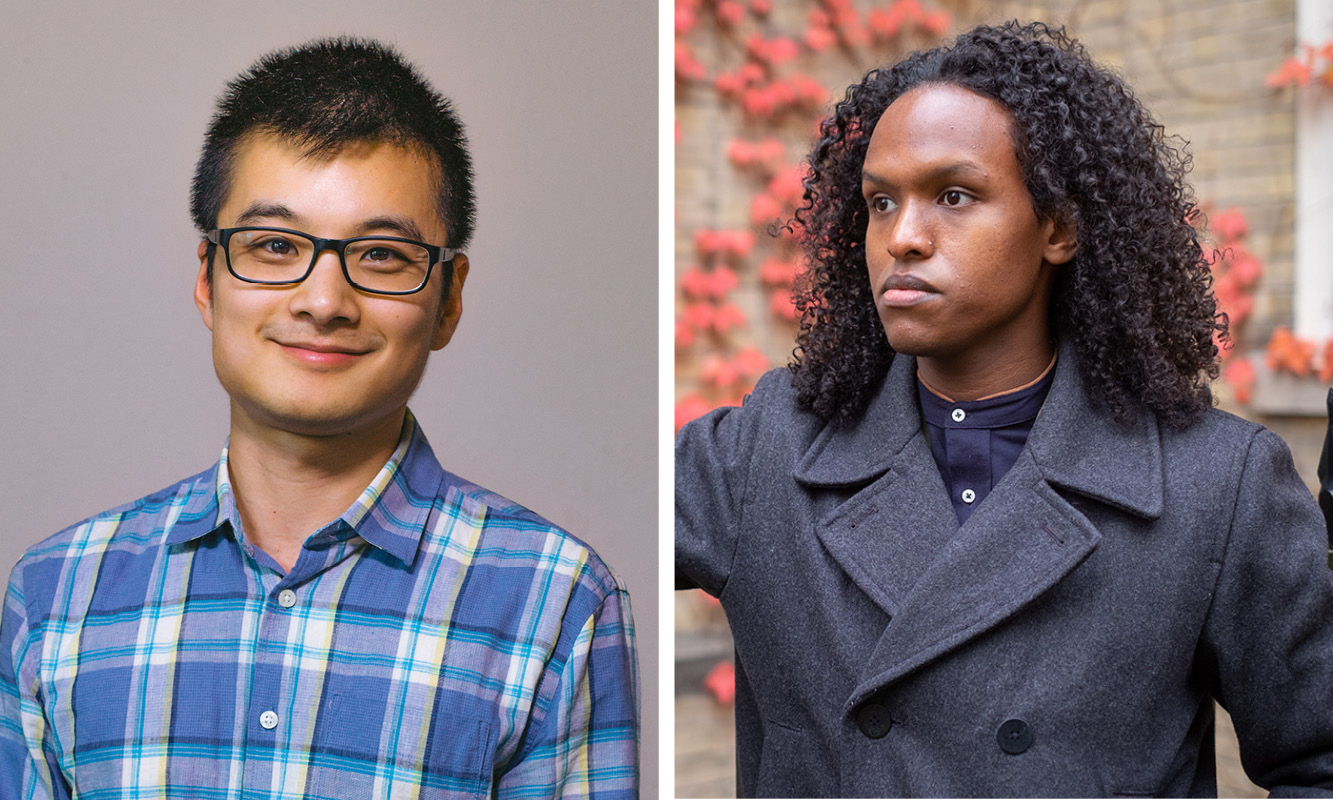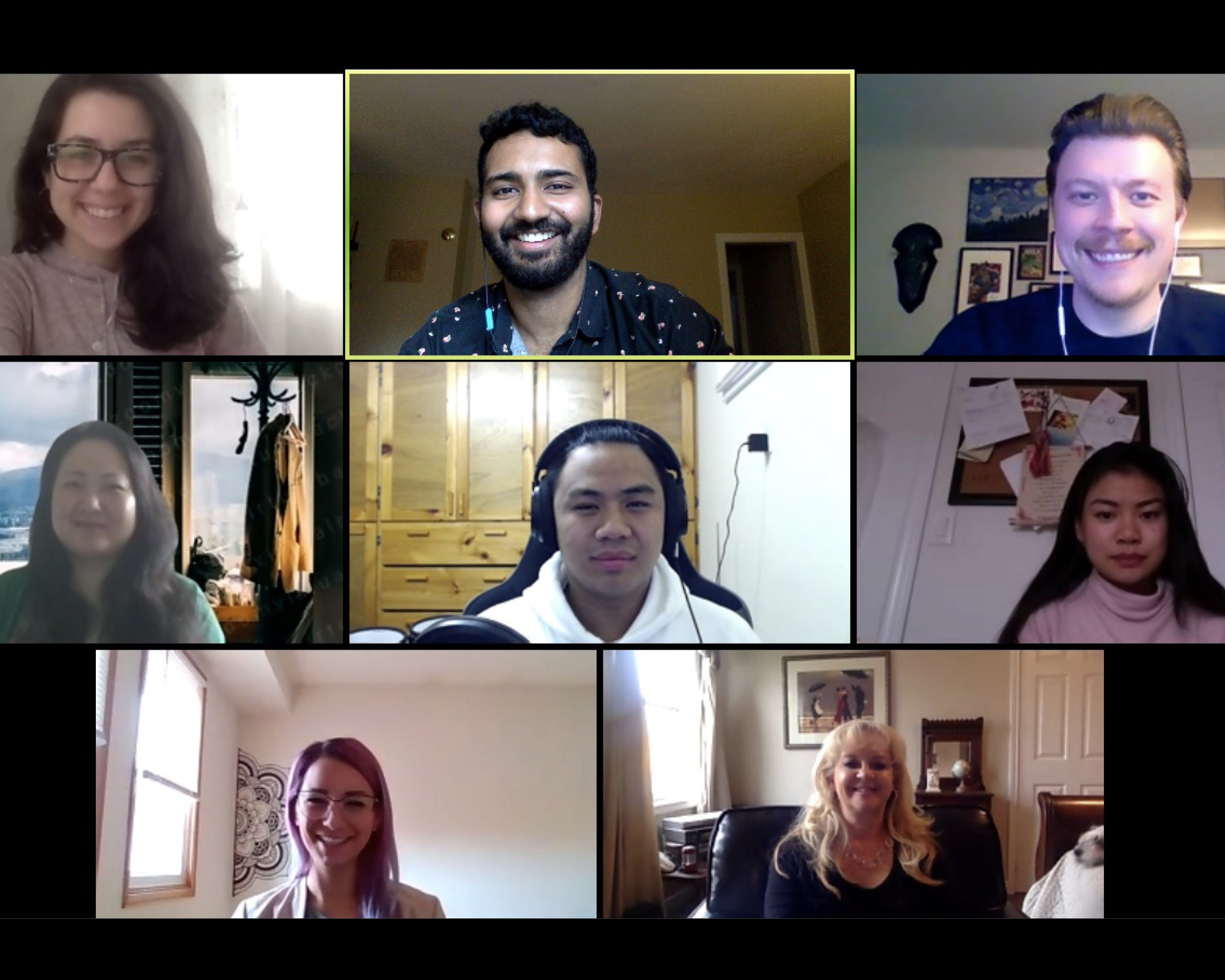How Factor-Inwentash Faculty students harnessed their counselling and leadership skills to help develop a new Peer Support Service at U of T
Categories: StudentsA new mental health service, launched this fall by Health & Wellness, provides University of Toronto students with the opportunity to seek support from a peer — a fellow student who is likely to be familiar with the particular challenges they face as well as the variety of services and resources available across campus.
Those providing support through one-on-one confidential online chats have other skills to offer as well: as second year or advanced standing master of social work students, they have training to help those struggling with mental health.
Simon Lam and Egag Egag (pictured above) knew that social work students were up for the job. In the fall of 2019, as co-presidents of the Factor-Inwentash Faculty of Social Work’s Graduate Student Association, the duo pitched the idea of a student-led counselling service to U of T’s executive director of Health & Wellness, Janine Robb. The new Peer Support Program launched less than a year later.
“First year Master of Social Work students at FIFSW develop competencies in clinical social work and gain valuable practice through our Faculty’s simulation program,” says Egag, referring to an initiative pioneered at the Factor-Inwentash Faculty that provides students with the opportunity to practice their clinical skills sessions with trained actors who play the role of clients.
“U of T also has the top social work program in Canada, where graduate students are putting research and theory into practice with practicums in hospitals and agencies across the GTA – why not use the students’ skills to help their peers?”
A member of the Presidential & Provostial Task Force on Student Mental Health, Egag first discussed the idea for a peer support service with Robb when he found himself sitting beside her after a meeting of the Task Force and Health & Wellness. They exchanged contact information and made plans to talk more.
“A Peer Support Service was long overdue on campus, and the need for one came up again through the Mental Health Task Force consultations,” says Robb. “Time and again, we’ve heard that students wanted a quick and easy way to get connected to someone they can trust, someone who understands them — the Peer Supporters are just that. Now, with the click of a button, students can get the drop-in support they need”
Determined get a pilot program up and running by fall 2020, the FIFSW students, with the support of Health and Wellness, convened a discussion with academic and administrative leaders from the Factor-Inwentash Faculty — including FIFSW’s Dean, Dexter Voisin; Associate Dean, Academic David Burnes; Assistant Dean, Field Education Eileen McKee; and Registrar Sharon Bewell — to determine how to best realize the project. Sandy Welsh, the vice-provost of student life also provided guidance to get the pilot off the ground.
“Our social work students are taught not only excellent clinical skills but also how to effectively build partnerships and connect communities,” says Dean Voisin. “This University collaboration illustrates the power of social workers to multiply the impact that can be achieved by any one stakeholder by engaging others.”
Master of Social Work student Mariana Paz-Soldan was brought on board to help develop the program with Health Promoter Pratik Nair as part of her practicum placement. The students who now provide peer support went through an additional 60 hours of training over the summer before the program officially launched.
Egag’s involvement in helping to realize the Peer Support program was inspired by his own past experience seeking mental health support. Before pursuing his MSW, he worked at the Centre for Addiction and Mental Health (CAMH). Now a graduate (both Egag and Lam are part of FIFSW’s Class of 2020), he says he is passionate about promoting accessibility to mental health services and, ultimately, helping to destigmatize mental health.
Before starting his MSW degree, Lam volunteered at a crisis line in British Columbia for over two years — an experience that strengthened his understanding of the importance of having someone to talk to, even if they are a stranger. “Crisis service providers provide support by helping people off load their anxieties and letting them know they aren’t alone,” he said. “They can also help people find ways to create a safety plan, or direct them to immediate services.”
Having pursued the Human Services Management & Leadership field of study as part of his MSW degree, Lam advocated for social work students to not only provide peer support, but also be involved in program’s evaluation, organizational leadership and outreach. “One thing we are really interested in is how we can measure the impact of this program,” he says.
Pratik Nair, a graduate of U of T’s Master of Public Health program, now oversees the Peer Support Service for Health & Wellness.
“Ultimately, mental health is about options. Finding a resource that works will depend on who a student is and where they are in their mental health journey. Something that works for one student may not work for another, which is why understanding the different options available at U of T can help,” he says. “This is where the Peer Support Service comes in. Students can bring in any concern: difficulty with an assignment, a tricky social situation, or confusion about how to access clinical support, and speak with a trained peer supporter to find help that works for them.”
To learn more about the program and how to access its services, visit U of T’s Student Life website.
(Zoom photo, above: FIFSW students, Mariana Paz-Soldan, Tristan Vanderbent, Natalie Han, Kevin So, Namdol Tenzin, and Lindsy Berman, with their Field Advisor Joyce Van Andel and Pratik Nair, Health Promotion Specialist, U of T Health & Wellness)
Where are they now?
Egag and Lam are both now Registered Social Workers. Here’s what they’ve been up to since graduating in the spring of 2020.
Egag Egag is currently working on publishing a manuscript for a project funded by SSHRC’s Canadian Graduate Scholarship – Master’s. He is also a Research Assistant within INQYR (the International Partnership for Queer Youth Resilience). He will soon launch a new project as Principal Investigator with FIFSW Professor Shelley Craig as Co-Investigator. He also co-authored two papers that were published in the latter part of 2020.
Simon Lam currently works as a Career Advisor & Educator at Victoria University, one of the undergraduate colleges at the University of Toronto. He is also a Research Coordinator with FIFSW Assistant Professor Rachelle Ashcroft and a Local Engagement Network Ambassador with the Ontario Association of Social Workers.
More student news:
- Q & A: Rebecca Schuss (MSW 2020) shares how her experience studying Indigenous Trauma and Resiliency at the Factor-Inwentash Faculty led to law school
- Manaal Syed receives the GADE Student Award for Leadership and Service
- Fall 2020 graduate Virginia Isaac is “proud to be among those making a difference in people’s lives during the pandemic”
- Master of Social Work student Amy O’Leary spoke to VICE News about what it’s like to spend election night working for a crisis line
- Alona Amurao’s award-winning article on Medical Assistance in Dying is published in Canadian Social Work Review
- TALK2NICE volunteers provide a sense of community for older adults experiencing increased social isolation due to COVID-19

